What is Giving Compass?
We connect donors to learning resources and ways to support community-led solutions. Learn more about us.
Search our Guide to Good
Start searching for your way to change the world.
This event recap is part of a series covering the We Give Summit: A Celebration of Collective Giving hosted by Philanthropy Together.
Giving circles are a great way for people to come together and make a difference collectively, but they are not immune from the problems that have plagued the philanthropic sector, including perpetuating inequitable staffing practices at nonprofits.
Jamila Jabulani, philanthropy and nonprofit outreach coordinator at Class Action, and Betsy Leondar-Wright, coordinator of Staffing the Mission project at Class Action, broke down the problematic practices and superior alternatives that giving circles can employ during the We Give Summit session: Good Work Deserves Good Pay: How to Fund Fair Compensation and Prevent Nonprofit Burnout.
Jabulani and Leondar-Wright drew from Class Action’s Staffing the Mission report, which includes survey responses about human resources practices at 82 U.S. nonprofits.
What Is Wrong with Current Nonprofit Staffing Practices?
Nonprofit staff make the work of their organizations possible, yet the report found that less than half (47%) of respondents rated their organization’s pay practices as fair or very fair. Nonprofit staff are the essential workers of the social sector but that isn’t reflected in the practices of their employers.
The report identifies these poor practices:
- Low pay, just over public benefit limits;
- No health benefits;
- No mileage reimbursement;
- Hiring “contractors” instead of full-time employees; and
- Unclear communication about pay.
All of these conditions contribute to burnout. Unsurprisingly, burnout disproportionately impacts women of color who are more likely to hold jobs with these conditions. Nonprofit staffing practices are not just unfair, they are inequitable.
Why Is This Happening?
The research identified three key drivers that reinforce these poor practices in nonprofit staffing.
The first is a philosophy that exists in society and within the staff themselves: The martyr model. The martyr model is the notion that those who work in nonprofits are lucky to do so and should be happy to sacrifice their own financial, mental, and physical wellbeing. This attitude prevents staff from advocating for their own needs and means that others see no need to advocate on their behalf.
The second problem is that prevailing wages are perceived (by those with power) to be fair. Pay compensation that is comparable to similar organizations is often seen to be sufficient, when in fact the whole sector is suffering. This mindset also perpetuates the harms of systemic inequality: Women and people of color have historically been paid less and will continue to be paid less as long as the status quo is maintained.
Funders are responsible for the third problem: The overhead obsession. Funders have long used overhead as a benchmark for nonprofit financial responsibility, causing nonprofits to squeeze all of their operating costs, including those related to staffing. In recent years, there has been significant pushback against overhead prioritization, but the damage has not yet been undone. A hyperfocus on overhead is unproductive and harmful to the sector and the staff that makes it possible.
Action Steps for Funders and Giving Circles Who Care About Equity
The research identified four ways for funders to better support nonprofit staff:
- Give more unrestricted operating grants and loosen limits on overhead spending;
- Ask questions about pay on grant applications;
- Increase distribution above the minimum 5% requirement; and
- Advocate for federal philanthropy reform.
Here is what these best practices can look like at each stage of a giving circle’s process:

Categories:
- North America
- Gender Equity
- Race and Ethnicity
- Collective Giving
- Nonprofit Infrastructure